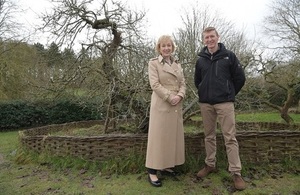
Credit: National Trust
- Tim Peake and Andrea Leadsom plant trees at the home of Isaac Newton grown from apple seeds taken to space
- today's event aims to inspire the next generation of astronauts and scientists to help the UK lead the world in new space technologies and innovations
Saplings grown from apple pips from Isaac Newton's tree and taken into space by astronaut Tim Peake have today (Monday 13 January) been given homes to inspire the next generation.
The 8 young trees were grown from seeds taken from the 'Flower of Kent' tree at Woolsthorpe Manor, National Trust, in Lincolnshire, the home of iconic scientist Sir Isaac Newton who drew out the principles of gravity after seeing an apple fall.
Tim Peake took the seeds with him when he went to the International Space Station on the British European Space Agency (ESA) astronaut's Principia mission in 2015.
The seeds spent 6 months floating in microgravity as part of the 'Pips in Space' project and then landed back on Earth in 2016 to be nurtured into young trees. The UK Space Agency, the National Trust and the Royal Botanic Gardens, Kew, worked together on the project.
The Eden Project in Cornwall, Jodrell Bank in Cheshire, and the National Physical Laboratory in Middlesex, are among the winners of a competition to become home to one of the special saplings. The winners represent a mix of fields including educational, research, science, arboreal and horticultural organisations.
Speaking at the event, Tim Peake said:
These trees are truly unique. They come from the iconic apple tree that inspired Sir Isaac Newton to ponder the forces of gravitation and continues to inspire to this day.
My mission to space was named Principia in homage to Newton's defining work that included his world-changing ideas about gravity. I wanted my Principia mission to inspire others, particularly young people, with the adventure of space and the excitement of science.
Now, thanks to the careful nurturing at Kew, the apple pips that flew with me into space have grown into fine young trees which I hope will continue to inspire potential Isaac Newtons.
Business Secretary Andrea Leadsom said:
Tim Peake's first trip to space became a source of national pride and inspired people across the country, including millions of school children, who were amazed at the wonders of space science and achievements.
This mission also contributed to the continued success of our space industry which is a vibrant and successful part of our economy.
It is my own personal ambition to ensure the sector has a bright future, with investments that lead to huge improvements in our everyday lives - from tackling climate change to communicating around the world.
Ian Cooper, General Manager for the National Trust, said:
Isaac Newton's time back home at Woolsthorpe in his Year of Wonders in 1665 to 1666 transformed scientific thinking, the impact of which is still felt today. As the trees grow and mature at their new homes, the partnerships we've formed in this project will enable us to share Newton's fascinating story with new people, hopefully inspiring curiosity and a passion for scientific endeavour.
The successful applications for the space saplings had to demonstrate a commitment to inspiring people through sharing stories of science, space exploration, physics, horticulture and conservation.
Dr Anne Visscher, Career Development Fellow, Royal Botanic Gardens, Kew, said:
We are delighted to have been part of such an exciting project. Apple seeds can lose viability if not stored properly, so we made sure they were kept at low humidity during their time in space.
After their return to Earth, we germinated them in our seed bank laboratories before handing them over to the nursery team, who have gone out of their way to keep the young trees healthy. We are hopeful that they will continue to mature in their new homes around the country whilst engaging visitors with their history of Newton, space travel and plant science.
In November 2019, the UK Space Agency announced it will invest £374 million per year with the European Space Agency (ESA) to deliver international space programmes over the next 5 years, following this investment from the UK and other member states.
Notes
The winners who will host Newton's space saplings are:
- Eden Project (Cornwall)
- Jodrell Bank Discovery Centre (Cheshire)
- Brogdale Collections, Home of the National Fruit Collection (Kent)
- Catalyst Science Discovery Centre (Cheshire)
- The Royal Parks and National Physical Laboratory (Middx)
- South Derbyshire District Council, Environmental Education Project at Rosliston Forestry Centre (Derbyshire)
- Woolsthorpe Manor (Lincolnshire)
- United Nations Office for Outer Space Affairs (Vienna)
On their return from space in 2016, the well-travelled pips went to Wakehurst, Kew's wild botanic garden in Sussex and home to the Millennium Seed Bank, where they spent 90 days at 5°C to simulate the winter cold needed to break dormancy. In May 2017, they were warmed to 15°C and the young seedlings started to emerge.
The space sector is booming, generating billions of pounds for our economy and creating 42,000 jobs. Attracting more young people to careers in science, technology, engineering and mathematics (STEM) is an important part of the UK Space Agency's mission. In September 2019 Tim Peake launched an initiative to help the sector deliver a million engagement activities a year with young people across the UK. The new programme aims to recruit more professionals as ambassadors to enthuse and inspire young people. The scheme will provide training and match them up with opportunities in schools and colleges. F






